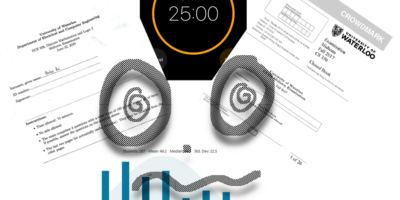It appears that someone is complaining that the University of Waterloo has acquired a reputation for churning out graduates who are somewhat lacking in oral and written English communication skills. As a result, the ELPE is up on the chopping block.
It is true that the ELPE is not an accurate representation of student writing skills, and does not assess oral communication skills at all. Many of my peers reported merely scraping a pass on the ELPE despite good scores in high school English. Conversely, something is clearly wrong because some students who do pass the ELPE do so with minimally functional English skills. But just because the ELPE is flawed doesn’t mean that we should scrap it altogether.
A short test is the easiest, most cost-efficient way to cursorily screen students for English-language proficiency. The ELPE, at its core, aims to serve this purpose: students who pass the test are cleared to continue on the rest of their university careers. Students who fail enrol in an ELPE tutorial or a remedial English course.
The ELPE’s failure appears to be in failing to screen out all the students with inadequate written English skills. We are, of course, assuming that taking a remedial English course for credit will improve a student’s skills enough for life after university, but that will be addressed later. Thus what the University needs is a better ELPE with less cursory marking that doesn’t weight 90% of the ELPE essay on the proper five-paragraph template, and instead concentrates on the flow of ideas and the student’s mastery of sentence structure and grammar.
To remedy this difference between the student’s actual skills and the student’s ELPE score, an audit should be conducted on ELPE grading practices. Based on the results, the marking scheme should be adjusted to better reflect a student’s actual writing skills rather than their willingness to conform to an essay template that isn’t used after high school and isn’t even a particularly effective means of making an argument. The passing mark might also need to be raised or lowered based on the results of this audit. Afterwards, the ELPE will be effective enough to distinguish between those who do and do not need additional help.
It is completely true that the ELPE does not evaluate oral communication skills, particularly because one is not allowed to talk during the ELPE. If the University wishes to evaluate a student’s spoken English proficiency, a solution has already been implemented by the Department of Electrical and Computer Engineering and the Department of Software Engineering: a technical presentation milestone, which requires a student to make a 12-15 minute presentation, with a short question period after. The presentation are marked by two evaluators on the bases of organization, overhead quality, presentation style, and response to questions. Those who fail the technical presentation milestone can retry their presentation during their 3A term, or their 2B work term. Those who have not passed their technical presentation milestone by their 3A work term are not allowed to enrol in 3B courses.
I cannot speak for how onerous the technical presentation milestone is, but it seems a damn sight less painful than having to take some unholy “SPCOM for engineers” course.
Speaking of mandatory courses, what else might an ELPE be replaced by? Mandatory English courses? Engineering students have enough program requirements that adding another degree requirement would be overly restrictive and time-consuming.
Furthermore, students are likely to regard any mandatory English courses as “birdy” and useless, much like WatPD. As well-meaning as WatPD intends to be, it is still hopelessly shallow and stylizes its case studies to the point of absurdity. An amoeba could pass a WatPD course. The content of any engineering-focused communications course is likely to trigger the same contemptuous student reaction, being hugely inconvenient, disinteresting, and repetitive. The ELPE is also inconvenient and disinteresting, but at least it only happens once, and you don’t have to pay $500 to take it. There’s no point in sending a proficient English user into a fluffy “English for Engineers” course. An engineering student will get better practice writing labs, work term reports, and workplace documents.
As for those who are not proficient in English, a 4-month course can’t fully compensate for 18 years of nonexistent or sorely neglected English skills, though 8 terms of English immersion in Kitchener-Waterloo might. I cannot offer any suggestions as to how to improve those students’ oral and written communication skills to the point of professional adequacy. They would get better personalized help after being screened with the ELPE, rather than getting lumped in with a class of resentful engineering students who used to have an elective they chose instead.
All in all, the ELPE is an important screening tool in identifying which students need additional English practice. Though it needs refinement, it should not be eliminated.




Leave a Reply